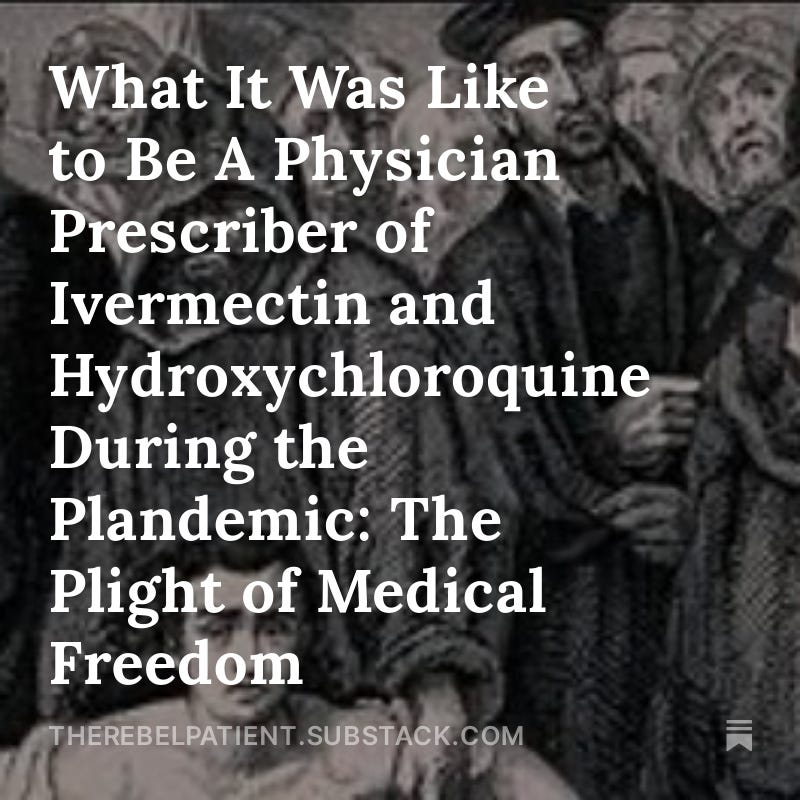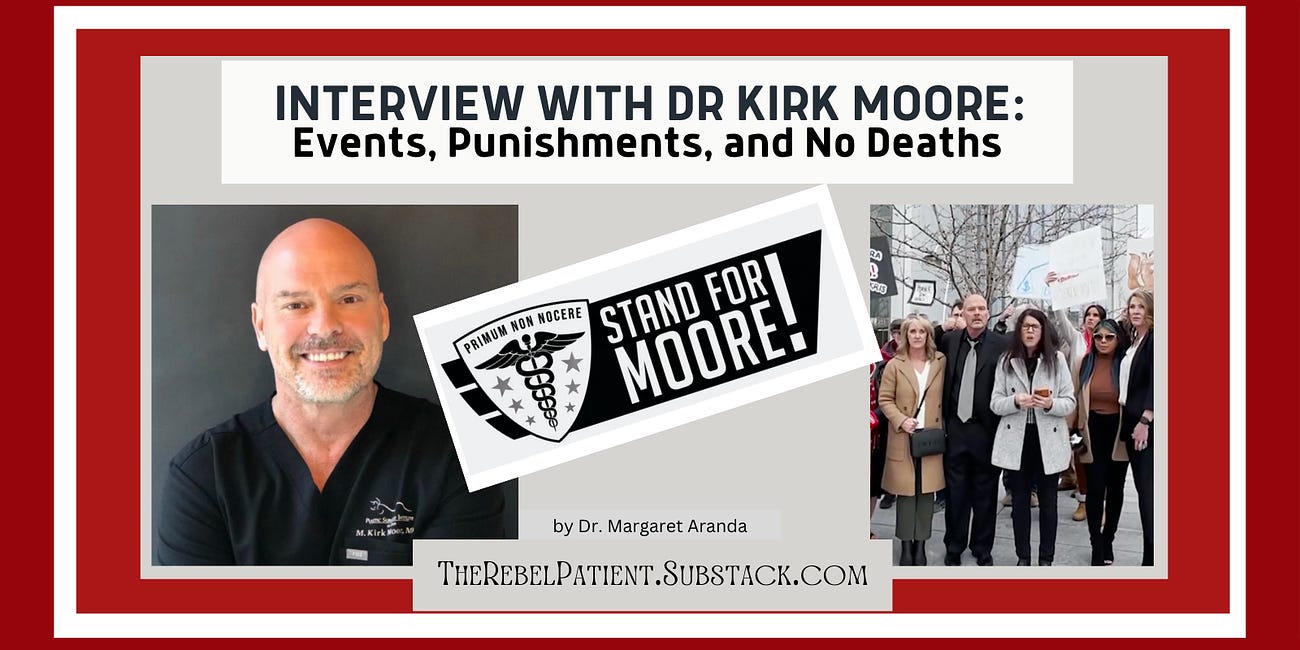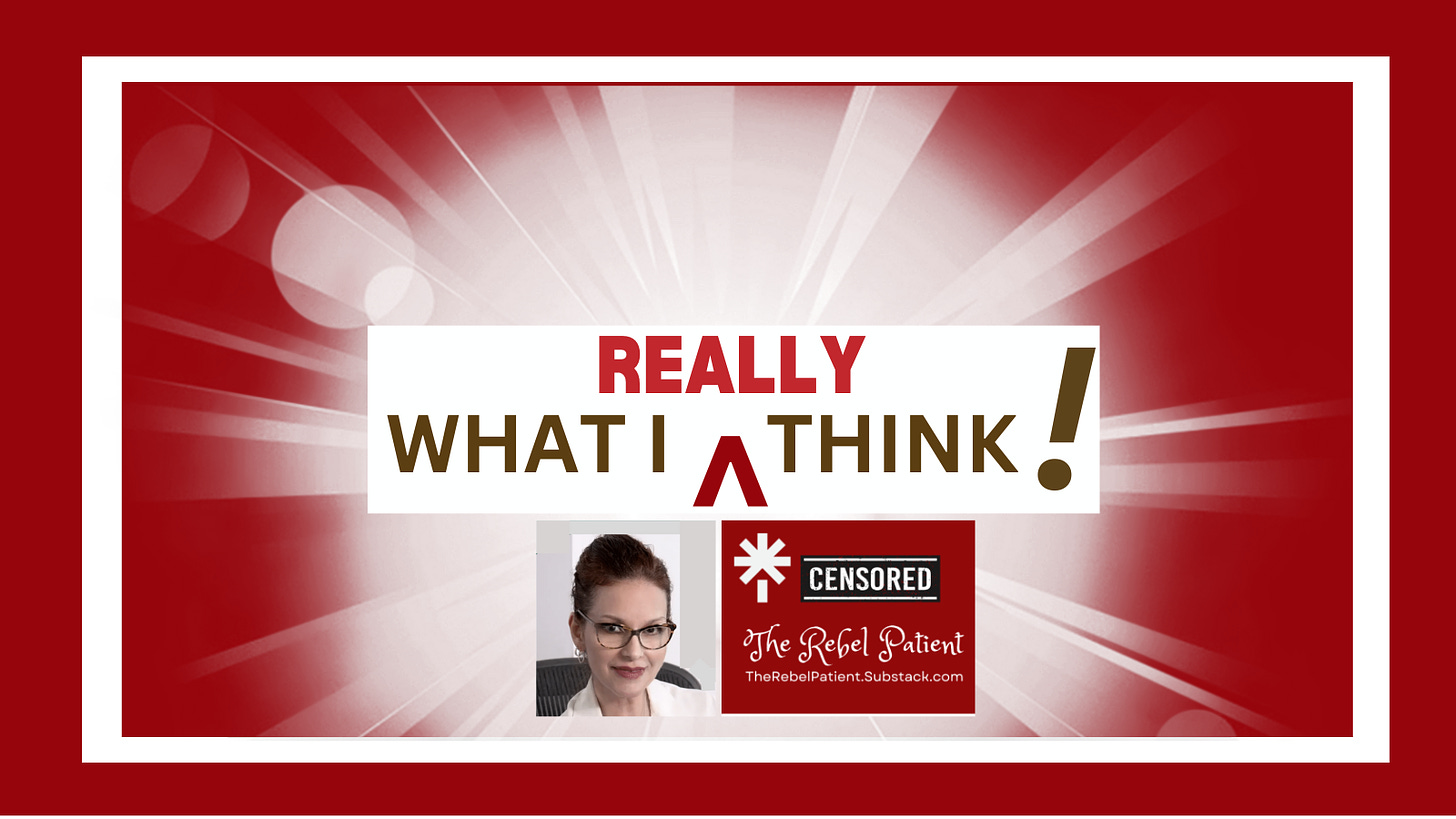What It Was Like to Be A Physician Prescriber of Ivermectin and Hydroxychloroquine During the Plandemic: The Plight of Medical Freedom
It was Like Repeatedly Undergoing The Grand Inquisition with the Underlying Conclusion That I Was A Criminal Guilty of A Crime. An opinion piece.
Addendum February 4, 2024: If you don't know Dr. Kirk Moore:
As we were prescribing ivermectin and hydroxychloroquine during the plandemic, many thoughts went through our minds.
We were unprepared and untrained to handle it all. Never before were we at odds with our local pharmacists, who seemed to be on a self-prescribed vendetta to usurp our authority.
Worse yet, pharmacists were suddenly “above” us, questioning our motives, and yes, practicing medicine.
After all, this was a new level of evil.
Like the opioid crisis before it, pharmacists simply didn't care about the legitimate needs of our patients, and furthermore, they didn't care if our patients died.
For me as a prescriber running a pain clinic, pharmacists were emotionally and professionally withdrawn, almost catatonic, when faced with a pain doctor’s opioid prescription for a long-standing pain patient who had no legs, or no arm, was wheelchair-bound, and dependent upon their pain prescription to hold a job and be the family breadwinner. For these patients, the failure of a pharmacist to fill an opioid prescription meant that literally, the patient would be not only destitute but suicidal.
Already as the first practicing ground, our Veterans had already been placed in this unfaily detrimental position as the VA Medical Centers suddenly refused to prescribe opioids. This resulted in an uptake of Veteran deaths by suicide, and a most unusual and potent scenario where they protested by shooting themselves at the doorstep to our country's VA Emergency Rooms.
Pain management went from “The 5th Vital Sign” after temperature, blood pressure, heart rate, and respiratory rate, to something that was “too complicated”, “disgusting”, and problematic.
And then there was physician burnout. And physician suicides, ranked the highest of any profession. Doctors simply retired their practices, changed to alternate patient populations, or retired early.
Exactly like the "opioid crisis" (that was really an illicit fentanyl crisis) whereby pharmacists refused to fill opioids like hydrocodone, pharmacists now had permission from their higher-ups to refuse to fill ivermectin or hydroxychloroquine.
And these were effective antidotes to the manufactured SARS-CoV-2, a genetically altered gain-of-function, deliberately researched bioweapon.
And by now, pharmacists were well practiced at refusing to fill.
CVS was the worst at refusing to fill, perhaps because they occupy every other mile in every city in the nation.
Pharmacists told me their daily computer screen had a revolving “reminder” that no law said they had to fill ivermectin or hydroxychloroquine. There was a specific permission that was reinforced on a daily basis, giving them “permission” to be God and decide who lived and who died.
The Huge Culprit
Perhaps the greatest problem that forced our hands at antagonizing pharmacists was the electronic medical record record (EMR) system. It forces one to pick a diagnoses for each written prescription. In fact, you cannot send a prescription without assigning a CPT or ICD-10 Code like “Lyme Disease” or “Covid”.
And if we cited "Covid" for any of our prescriptions, the pharmacists had the green light to refuse to fill.
Over and over again during the plandemic, and for the first time ever on a prescription, the pharmacists called us to question our prescriptions.
They did not do it because they cared.
They all did the same thing, as if it was from a script.
First. They told us they were calling us to “gain more clinical information” or “because they had questions” before filling. Over time, we knew this was just alternative language for, “I’m not going to fill your prescription.”
Then. They asked for the patient's symptoms, prying into the chart and HIPPA-protected information. They pretended to care.
They were nosy, snooty, questioning, and treated us like criminals.
The Grand Finale. Oh, they went in for the kill. They asked us for the CPT diagnostic code.
At first, we were almost cute in our unsuspecting manner as we innocently and truthfully said, “Covid”.
It was all they needed.
The Rejection. They said, “I don't fill ivermectin for Covid” or “I can't fill this for Covid”.
Covid wasn't the death sentence - the pharmacist was.
There was no tone of apology or humanity in their voices. It was as if the human behind the voice was a robot who said the same thing to different doctors all day long.
Do you feel that gap of silence, that missing link? Can you empathize with our plight, knowing that our patient's life was in their hands? How about getting another phone call from another pharmacist while you're still on the line getting questioned?
It was as if they were purposely trying to stall us and waste our time so that we wouldn't be able to find another pharmacist.
We didn't go to medical school for this.
The pharmacist was not our equal. We don't answer to them. They were abusing their power.
It was bad enough that this horrific experience put us through an inquisition such as they were empowered to deliver. No, we would have tolerated the inquisition with more acceptance, had our patient's history been enough. That was the problem: it wasn't enough.
Some pharmacists never filled one prescription. Not for any doctor, not for any patient. It was as if they got paid to not fill.
And out of desperation to keep our oath, we tried different ways to get what our patients needed.
And How We Tried
At first, we had long academic conversations with the pharmacist. Every one of their arguments was met by our science-based counter arguments.
And we yelled at them. Sure, we lost our cool because a life was on the line. They frequently hung up on us, berated us, and threatened to report us to our medical board. Concurrently, others were reporting us to the medical board for writing letters of exemption from the jab.
One time, a man in Oregon needed ivermectin for his wife. Initially, the pharmacist refused to fill. Of course, we were incredulous. Our emotions were high, as life and death were at stake and never before was a pharmacist actually obstructing our own patient care. And then we realized:
Why, they were practicing medicine.
And they were empowered to do so.
We finally found a pharmacist who would fill, and the next morning, he called us to say that she felt “10,000 times better.” In the beginning, that was enough for the gain-of-funcion, lab-produced bioweapon. When Omicron hit, people were not getting better after days, so in a short time, we added hydroxychloroquine and zinc, with the same amazing turnaround we initially experienced with ivermectin. To this day, if patients do not get better withing 24-48 hours, many practitioners add hydroxychloroquine, or just start out with it.
What We Didn’t Know in the Beginning
We didn’t know how to substitute another agent for ivermectin, nor for hydroxychloroquine.
And it was generally not a good idea to try boiling your own grapefruit because the stakes were too high and too many mistakes could be made.
How We Bypassed The System
Eventually, we landed on pharmacists who filled as much as we wanted ~ these were small, independent pharmacies, little “Mom and Pop” stores not being squashed by “higher ups”. These were pharmacists with a conscience who actually took their own oath and wanted to save lives.
The Mom and Pop pharmacists saved America.
When We Couldn't Bypass the System
As we found pharmacies that would fill, we stayed with them because there was no time to argue. We were too busy.
Some patients thought they were being helpful if they first vetted their own pharmacist who would fill. But they didn't understand that meant we would need to add another pharmacy into our electronic medical record system- and that took time, which we didn't have.
Having a pharmacist who would fill did not solve all our problems. The day of the week also mattered.
If you got sick on a Monday or Tuesday, we could have medications overnight delivered to your door on Tuesday or Wednesday. Same with Wednesdays or Thursdays, when overnight delivery was possible.
But if you got sick on a Friday, Saturday, or Sunday, we were stuck with the Big Problem. We couldn’t bypass the system to get medications to people fast enough.
The Big Problem
Filling on a Friday, Saturday, or Sunday was generally impossible for overnight delivery, so on weekends, we were both stuck with trying to get your prescription filled at… you guessed it… your local pharmacy.
Here we were, back at the initial problem: no one would fill your prescription on a weekend. We had to try the big pharmacies again, especially because the smaller ones were usually closed on Sundays.
If Sunday was Day #1 of sickness for an otherwise healthy 30-year old, that was one thing. If Friday was Day #9 for a 90-year old man with one lung, that was yet another thing. These times were scary for all of us, because we didn’t know whether or not the patient would desaturate or turn blue, requiring additional oxygen.
We lost sleep, sat on pins and needles, and waited for the phone to ring again. And then it would ring. Another pharmacist questioned us, got the history, and then -you guessed it- asked for the diagnosis. If we said, “Covid”, - you guessed it- they would refuse to fill.
Hundreds of times later, here we were. Exhausted, stressed, but pushing on because we knew we were keeping our oath; that gave us serenity and peace.
And then the phone rang again.
WHAT I REALLY THINK
I quickly learned that
Keep reading with a 7-day free trial
Subscribe to The Rebel Patient™ to keep reading this post and get 7 days of free access to the full post archives.














